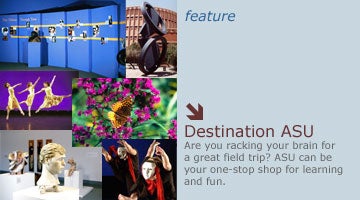|
feature

Destination ASU
By Diane Boudreau
Whether you’re looking for art exhibits,
ancient artifacts, or space exploration, there’s something here
for every class. The following is a selection of facilities that offer
tours for school groups. Please reserve all tours at least two weeks
in advance.
ASU Art Museum
http://asuartmuseum.asu.edu/education/tours.htm
(480) 965-2787
The ASU Art Museum is recognized as one of the Southwest’s most
significant contemporary art institutions. The museum offers free tours
for school groups. An optional hands-on workshop involves an art-making
project and is best for children aged 4-12.
The ASU Planetarium
http://phyastweb.la.asu.edu/planetarium/daytime_info.asp
(480) 965-6891
The ASU Planetarium can accommodate groups of up to 50
people. Most presentations last for 50 minutes and are geared to the
abilities of the group. Preschool and kindergarten shows last 20 minutes.
There is a $30 fee per presentation, $10 for preschool and kindergarten.
Center for Meteorite Studies
http://meteorites.asu.edu/
(480) 965-5734
The ASU Center for Meteorite Studies houses the world's largest university-based
meteorite collection, with more than 1,500 separate meteorite falls.
Staff members offer half-hour talks to school groups of 15 or fewer students.
Larger groups can split up and visit other facilities such as the R.S.
Dietz Museum of Geology, or the Life Sciences Living Collections, while
waiting (see below).
Deer Valley Rock Art Center
http://www.asu.edu/clas/anthropology/dvrac/
(623) 582-8007
The Rock Art Center is located in north Phoenix at the intersection of
35th Avenue and Deer Valley Road. A quarter-mile, barrier-free trail
provides an unobstructed view of ancient engravings along with a wide
variety of plants and wildlife. Teachers are encouraged to request free
preview passes so that they are sure of their surroundings before bringing
school groups. The Center offers guided and self-guided tours.
Mars Space Flight Facility
http://marsed.asu.edu/
(480) 965-1790
The Mars Space Flight Facility supports the Thermal Emission Spectrometer
(TES) Experiment on the Mars Global Surveyor Spacecraft and the Thermal
Emission Spectrometer (THEMIS) Experiment on the Mars Odyssey Spacecraft.
The facility also houses the ASU Mars Education Program, which provides
opportunities for teachers and students to join in the excitement of
Mars exploration.
Museum of Anthropology
(480) 965-6224
ASUMA displays collections from physical anthropology, archaeology, and
sociocultural anthropology. Tours are particularly appropriate for kids
aged 8 and up.
In addition to formal tours, the ASU campus offers several self-guided
attractions that are worth a look. These attractions do not require reservations.
R.S. Dietz Museum of Geology
http://www.asu.edu/it/museums/geology.html
(480) 965-7065
The Geology Museum showcases minerals, gems, fossils from around the
world, the only active seismograph in central Arizona, a six-story Foucault
pendulum, and mammoth bones from Chandler, Arizona. The museum does not
offer guided tours, but groups of up to 15 at a time are welcome to peruse
the collection. The museum is free and is open Monday through Friday,
9 a.m.-12 p.m.
Public Art at ASU
http://herbergercollege.asu.edu/public_art/public_art.html
From Depression-era murals to contemporary sculpture, public art at ASU
reflects the rich historical traditions of the university and Arizona,
as well as more recent artistic expressions. Visit the Web site to download
a walking tour of all the pieces.
Life Sciences Center Living Collections
(480) 965-3369
Visit the Life Sciences A wing to see a variety of reptile displays,
including the only complete living collection of all eighteen sub-species
of Arizona native rattlesnakes. In the center of the A wing is a gallery
displaying skulls and skeletons of indigenous wildlife.
The Arboretum at ASU
http://www.asu.edu/fm/arboretum.htm
(480) 965-8467
ASU’s main campus is the largest public urban arboretum in Arizona.
Included in the collection are palms and palm-like plants, deciduous
trees, fruit-bearing trees, conifers, evergreen trees, desert trees,
cacti, succulents, and desert accent plants. Arboretum walking guides
are available at the ASU Visitors Center on Apache Boulevard and Rural
Road.
read more
Grammar Usage
Bank
The
Grammar Usage Bank features simple, straightforward lessons created by
students in ASU's ENG 482: Methods of Teaching English Language. Classroom
teachers are invited to run these lessons off either for class instruction
or for use by individual students who need a refresher lesson and practice
with one or more of the most common mistakes. Read more
|



